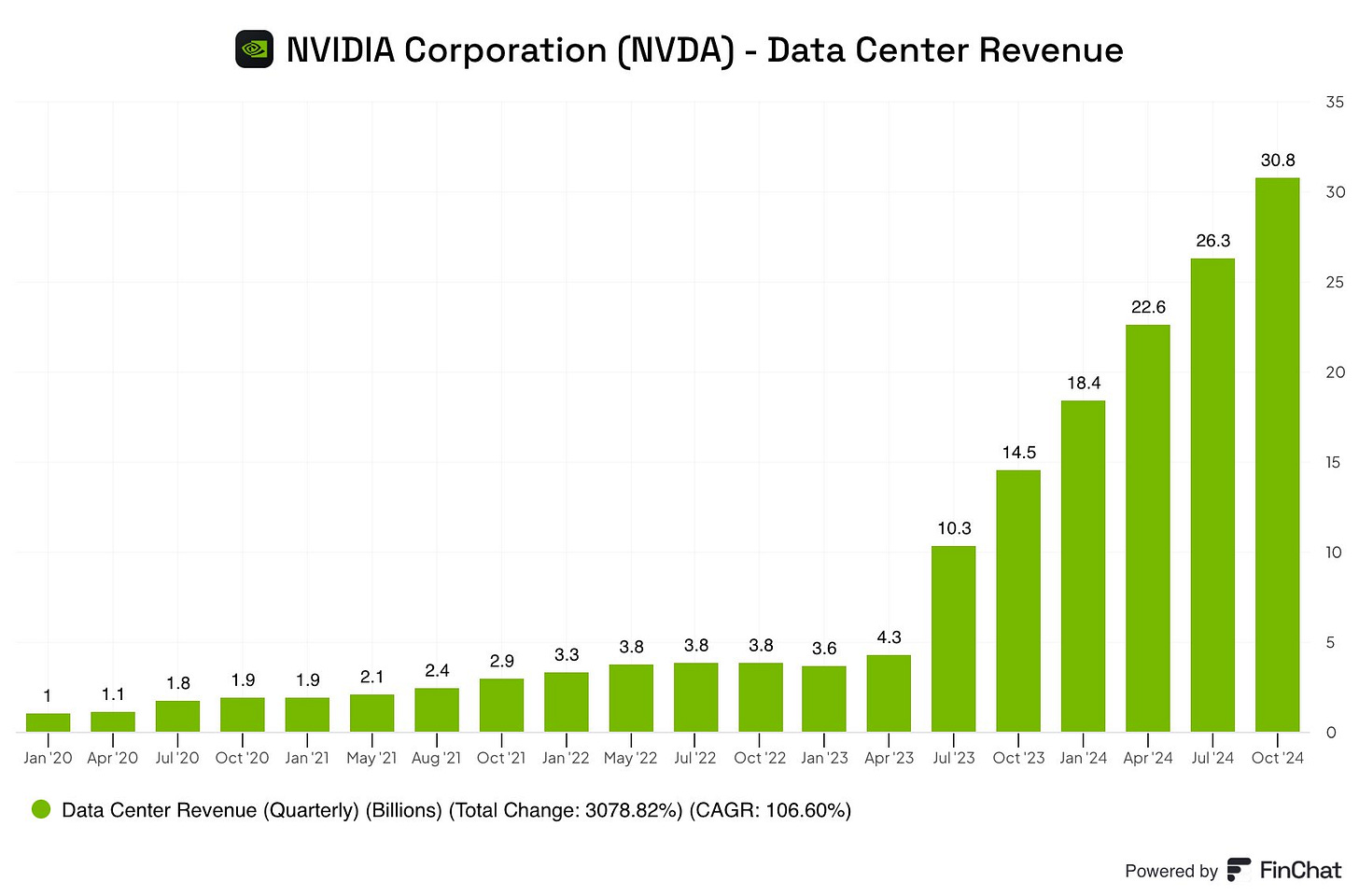537: Going Deep in Nvidia's Q3, Jensen in Japan, Danaher & Thermo Fisher, Apple + TSMC, M4 Chips, China's DeepSeek R1, and St. Peter's Basilica
"sometimes unrealized possibilities are more interesting"
The only normal people are the ones you don't know very well.
—Alfred Adler
👩🏻🍳🍳1️⃣ I’m not into the “omg I never want to touch plastics they’re the devil 👿” camp, but I recently replaced our plastic kitchen utensils with wooden ones — teak, to be specific.
It seemed like if I was going to do it anywhere, the kitchen was the point of highest leverage. These tools come in direct contact with food, often at fairly high temperatures, and I had noticed my plastic spatulas showing visible wear (logically, pieces end up in food).
I also saw this recent study revealing that they could contain Brominated flame retardants (BFRs) and organophosphate flame retardants (OPFRs) due to contamination from recycled electronic waste:
plastics from electronics are often recycled and can be incorporated in household items that do not require flame retardancy, resulting in potentially high and unnecessary exposure.
This study sought to determine whether black plastic household products sold on the U.S. market contained emerging and phased-out FRs and whether polymer type was predictive of contamination. A total of 203 products were screened for bromine (Br), and products containing >50 ppm Br were analyzed for BFRs, OPFRs, and plastic polymers (e.g. acrylonitrile butadiene styrene, high impact polystyrene, polypropylene).
FRs were found in 85% of analyzed products, with total FR concentrations ranging up to 22,800 mg/kg. [...]
The detection of FRs in collected household products indicates that recycling, without the necessary transparency and restrictions to ensure safety, is resulting in unexpected exposure to toxic flame retardants in household items.The good news?
Teak utensils are pretty cheap. If you search Amazon, you’ll find a crapload of options hovering around $30-50 for complete sets.
They should last a very long time if you occasionally oil them with food-grade mineral oil and don’t put them in the dishwasher (they can probably handle the dishwasher for a while, but it’ll shorten their lives because the detergent will strip the wood of natural oils and the high heat and drying cycle will cause the wood to warp and crack).
If you don’t want to go for wood, I’d recommend metal or quality silicone utensils designed for high temps (I have a few of those too).
👩🏻🍳🍳2️⃣ I may as well turn this into a cooking Edition…
This video talks about the opposite of what we always hear: When is it good to have food stick to a pan, and why?
🚨🎙️🗣️🗣️🗣️🗣️🗣️🗣️ ⏳↔️ In case you missed it, I did a new podcast about TENET and Christopher Nolan with a great group of friends:
It was a ton of fun to record, and I hope you are entertained by it (and maybe learn a few things about filmmaking/time travel).
🏦 💰 Business & Investing 💳 💴
🔥 Diving Deep Into Nvidia Q3 + Tokyo AI Summit Keynote 🤖
On this steamboat, we discussed Nvidia more often 2-3 years ago than now that they’re the biggest company in the world. The goal is not to be a hipster about it, it’s just that sometimes unrealized possibilities are more interesting than realized ones (potential energy vs kinetic energy).
But they’re still a fascinating company and I thought we could analyze their latest quarter and Jensen’s recent keynote at the AI Summit in Japan.
First, let’s take a sec to note something extraordinary. As Barbarian Capital pointed out, Nvidia’s *net income* in Q3 was more than their *revenue* in the same quarter a year ago 🤯
Not something you see every day! Businesses that grow this fast usually aren’t at that scale, often don’t have physical products, and pretty much never have free cash flow margins of 55%.
Anyway, back to it. Here’s Jensen at the Tokyo AI Summit on the inference scaling law revealed by OpenAI’s Strawberry/o1 models:
When Strawberry or OpenAI's 01 was announced, it exposed the world to a new type of inference… ChatGPT is one shot… whatever prompts you provide, it delivers an answer through one shot.
However, we know that thinking is oftentimes more than just one shot. And thinking requires us to maybe do multi-plans, multiple potential answers that we choose the best one from, just like when we're thinking. We might reflect on the answer before we deliver the answer. Reflection. We might take a problem and break it down into step by step by step.
Chain of thought. There are many different technologies that we've invented that makes possible for inference to perform better and better as we apply more and more compute.
Now we have the second scaling law, inference scaling law. Not just generation of the next word, but thinking, reflecting, planning.
These two simultaneous scale-offs are gonna require us to drive computing at extraordinary speeds.
Jensen then goes on to describe Blackwell — the whole system, not just the GPU chip — and it’s incredibly impressive. You can see for yourself here in the video (18min32secs into it).
The industry's current trajectory scales computing power four-fold annually projecting a millionfold increase over a decade.
For comparison Moore's law achieved 100x fold increase per decade.
Moore’s Law brought the world incredible bounty. If Nvidia can keep the trend that they’re on going for a while longer, it’ll be incredible where we end up even after just a pretty short time.
Here’s Jensen in Japan on AI agents:
None of these agents can do 100% of anyone's task, anybody's job. None of the agents can do 100%.
However, all of the agents will be able to do work for 50% of your work.
This is the great achievement. Instead of thinking about AI as replacing the work of 50% of the people, you should think that AI will do 50% of the work for 100% of the people.
By thinking that way, you realize that AI will help boost your company's productivity, boost your productivity. People have asked me, is AI going to take your job? And I always say, because it's true, AI will not take your job. AI used by somebody else will take your job.
Now, let’s have a look at Q3:





